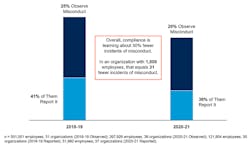The fallout from the pandemic has reached the compliance arena, with reporting dropping 30% according to a new survey from Gartner, Inc. Employees are both less likely to observe misconduct and less likely to report it when observed.
“The increase in remote and hybrid working practices has reduced the amount of misconduct and the potential to observe it,” said Chris Audet, senior director, research in the Gartner Legal, Risk & Compliance practice in a statement. “However, what we see in the data is more complex: misconduct such as gifts and entertainment and travel abuse is falling, but things such as intimidation and unwanted behavior are on the rise.” Misconduct is certainly still occurring since the pandemic, albeit in changing ways, but compliance is hearing about it 30% less frequently than before.
Since the pandemic, employees are a lot less likely to speak up if they sense something is wrong, whether or not the frequency of misconduct is higher or lower,” said Audet. “A culture where employees don’t think others are reporting misconduct has negative implications for the business. Employees are less likely to see their company as ethical, less likely to think the company cares about them, and less likely to be engaged in their jobs.”
Changing Landscape for Misconduct
There is a difference between remote employees who observe 11% less misconduct than their in-office peers. One of the drivers for this dip, according to the survey is the decrease in observed misconduct around travel, gifts and entertainment as opportunities for misconduct in these areas are significantly lower.
Yet, types of misconduct that compliance typically has a very low tolerance for are holding steady or on the rise. “Bullying, intimidation and unwanted behavior are up 7% for remote workers; misuse of time and company assets is up 3%,” said Audet. “Sexual harassment is relatively steady at just 1% lower for remote employees since the pandemic.”
There are also new forms of misconduct that are emerging due to a virtual environment, such as inappropriate video backgrounds or online behavior.
“Compliance is generally great at putting measures in place that drive compliance reporting in an office setting,” said Audet. “For example, nearly all compliance leaders have created multiple reporting channels to boost ease of reporting, and four-fifths have standalone anti-bullying or anti-retaliation policies.”
What some compliance leaders are missing, according to Audet, is that remote workers have a fundamentally different relationship with their employers in which it’s much easier for apathy to creep in because for many people the business is at arm’s length.
“For remote workers, when they close their laptop they aren’t at work anymore: office life isn’t really part of their daily social equation, they aren’t as embedded in the compliance culture” said Audet. “In many situations, remote employees are going to tell themselves reporting isn’t the right thing to do purely in terms of self-interest. They are making a cost-benefit calculation and can envisage speaking up working out badly for them.”




